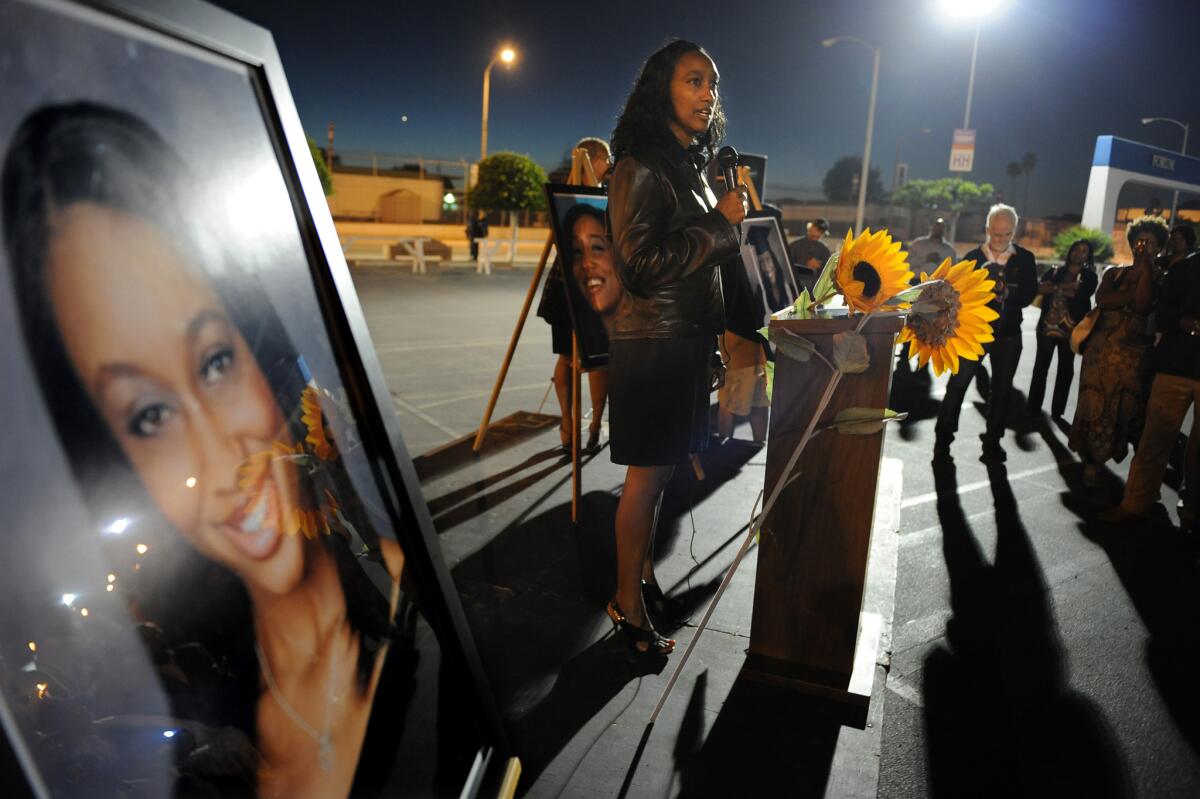Attorney general’s probe finds no evidence of wrongdoing by deputies in death of Mitrice Richardson

A California attorney general’s investigation has failed to uncover evidence that would merit criminal charges against Los Angeles County sheriff’s deputies for their handling of the disappearance and death of Mitrice Richardson, according to an official letter.
The 24-year-old woman went missing in 2009 after being released from the sheriff’s Malibu/Lost Hills station in the middle of the night, even though she was without a phone, wallet or car. Nearly one year later, her decomposed body was found in a Malibu Canyon ravine, several miles from the sheriff’s station.
To this day, the cause of Richardson’s death remains undetermined, according to the coroner’s office.
Richardson’s family insists she was the victim of foul play and faults deputies for their treatment of the young woman. Deputies had arrested her for failing to pay an $89 tab at Geoffrey’s restaurant in Malibu, and then released her about 12:40 a.m. even though she showed signs of potential mental illness.
Her family has also blasted deputies for mishandling her remains. Coroner’s officials said deputies moved her body parts without permission, and months later, Richardson’s mother was visiting the site and found a finger bone that belonged to her daughter.
The office of then-Atty. Gen. Kamala Harris balked at reviewing the case in 2015, saying there was “no reasonable inference” that deputies broke the law. But months later, in February 2016, the case appeared to gain new momentum after Harris agreed to review the matter at the request of Richardson’s father, Michael Richardson.
That yearlong inquiry appears to have revealed no evidence of wrongdoing. A Dec. 31 letter from the attorney general’s office to Richardson’s father, which was released to The Times, briefly outlines why “there is insufficient evidence to support a criminal prosecution for destruction, alteration or concealment of evidence.”
The closure of the investigation was first reported by the Los Angeles Daily News.
The letter to Richardson’s father also noted that the statute of limitations for concealment or tampering of evidence had passed more than two years ago.
Reached by phone on Thursday, Michael Richardson said he was disappointed in the findings of the attorney general and angered by the knowledge that a statute of limitations prevented prosecution. He maintains his daughter was murdered and that her killer remains at large.
“I’m a great deal upset,” Richardson said. “We have too many loopholes and too many unanswered questions.”
Michael Richardson also accused Harris of taking interest in the case as part of an election-year bid for publicity, noting that the announcement in February 2016 that she would review the case coincided with her campaign for U.S. Senate. Harris was elected to the Senate in November.
“Kamala Harris is a phony,” Michael Richardson said. “We don’t need people like that leading us.”
A spokesman for Harris did not immediately respond to a request for comment.
In its review, the attorney general’s office looked at whether sheriff’s officials had withheld video taken of Richardson while she was at the sheriff’s station as well as whether the removal of her remains from the site where they were found before the coroner’s office arrived had violated the law.
In the letter, Senior Assistant Atty. Gen. Lance Winters acknowledged that sheriff’s Capt. Tom Martin, the former station commander, did not immediately hand over videotape of Richardson to her family but noted that the video “was preserved and eventually disclosed.”
Los Angeles Police Department detectives, who were investigating Richardson’s disappearance, were aware of the tape, so there was no apparent criminal aim to hide the video evidence, Winters said.
“We also were unable to find any indication that the videotape had been altered or tampered with, nor did we find any evidence suggesting officer misconduct on the videotape,” Winters added.
Jail records revealed no clues that evidence was concealed. Winters said that the station phone log did show Richardson made four phone calls to her grandmother, but AT&T phone records did not reflect those calls.
“Although the calls could have been made, those calls were either not picked up or not made at all,” Winters wrote.
The attorney general’s office did conclude that sheriff’s deputies removed Richardson’s remains before the coroner’s office arrived, but said it was “highly disputed” whether the coroner’s office gave them permission to remove them.
That finding contrasts with what the coroner’s office said in 2010, when Assistant Chief Coroner Ed Winter publicly rebuked deputies for removing her remains without approval.
A detective at the time countered that investigators removed the body because they were concerned about approaching nightfall and the possibility that animals might disturb the remains in the rugged ravine.
“There is no indication that any part of the discovered remains were destroyed or concealed,” Winters wrote in his letter. “Ample photographs were taken of the skeletal remains at the site before and after they were unearthed so that the whole recovery process was well documented.”
Sheriff Jim McDonnell said in a statement that he agreed with the findings, and noted that the case has been reviewed by the Sheriff’s Department as well as the county’s inspector general and the OIR Group, a police oversight consulting firm.
“Each inquiry has produced the same results,” McDonnell said. “There is no evidence of concealment, tampering of evidence or criminal wrongdoing.”
Richardson’s parents, each received $450,000 from the county in a legal settlement.
Michael Richardson continues to maintain that his daughter was killed, and in a conversation Thursday night he asked deputies who may know more about her death to come forward.
“These officers took an oath to protect and defend people,” he said. “You didn’t take an oath to keep secrets.”
Twitter: @MattHjourno
More to Read
Sign up for Essential California
The most important California stories and recommendations in your inbox every morning.
You may occasionally receive promotional content from the Los Angeles Times.











